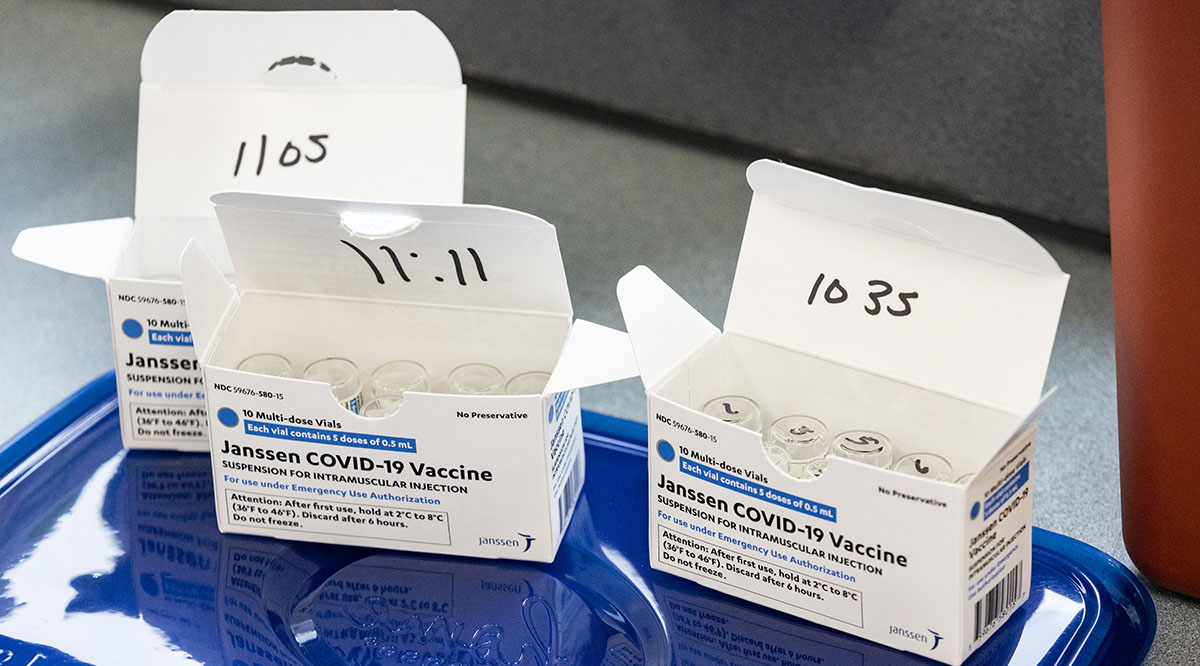
Editor’s note: On Oct. 20, the Food and Drug Administration gave Emergency Use Authorization to a second shot of the Johnson and Johnson COVID-19 vaccine at least two months after the first dose. The agency also allowed people who got a first dose of the Johnson and Johnson vaccine to receive either a shot of the Pfizer vaccine or half a dose of the Moderna vaccine.
Nearly 14 million people in the United States have received the single-dose Johnson and Johnson (J&J) COVID-19 vaccine. But as the latest COVID-19 surge has raised questions about how well the three vaccines that are authorized in the United States hold up against the highly infectious delta variant, and as public health officials debate the need for booster shots in the coming months, many J&J vaccine recipients have been frustrated by the focus on the two more commonly used vaccines — Pfizer and Moderna — and concerned about how little data exists about the J&J vaccine.
Some have gone so far as to seek an additional vaccine dose, including of a different brand — even in the absence of federal authorization for the vaccines to be used that way.
To be sure, recent data continue to suggest that all the vaccines, including J&J’s, are highly effective at protecting against the worst outcomes of COVID-19.
“People who have received the J&J vaccine should be confident they have a high level of protection against hospitalization and severe disease,” says Erika Reategui Schwarz, MD, an infectious disease specialist and assistant professor of medicine and hospital medicine at Icahn School of Medicine at Mount Sinai in New York City and an investigator on the initial J&J clinical trial.
Still, questions remain. Here’s what we know about the J&J vaccine right now.
Avoiding the worst outcomes
Despite the limited data available in the United States, research has found that the J&J vaccine is doing what it’s meant to do: save lives.
In July, J&J released the results of two studies that found that people who were vaccinated with the single-dose vaccine elicited an immune response against the delta variant and that the immune response lasted for at least eight months.
And in early August, a clinical trial that followed nearly 500,000 health care workers in South Africa found that the J&J vaccine was 71% effective against hospitalization and 95% effective against death due to the delta variant.
While some people who were fully vaccinated did become infected with the virus, the vast majority of those people had mild symptoms that did not require hospitalization.
As the delta variant continues to spread rapidly, breakthrough infections are increasing among recipients of the J&J vaccine as well as the mRNA vaccines, Reategui Schwarz explains. Even so, vaccinated people account for a very small portion of hospitalizations and deaths due to COVID-19 in the United States.
“Right now, all the vaccines are still effective against the variants,” she says. “We haven’t seen a variant that can fully escape immunity.”
A rocky reputation
Although the J&J vaccine is effective, its uptake in the United States has been choppy. When the Food and Drug Administration (FDA) approved it for emergency use in February, it was lauded as a game-changer in the fight against COVID-19 because public health experts said that its single-dose regimen and easy storage requirements would make it more accessible than the two-dose mRNA vaccines that had already been approved.
But in the six months since then, the vaccine has faced several hurdles. It has shown a lower rate of preventing COVID-19 symptoms from the original coronavirus compared to the mRNA vaccines (66% efficacy vs. more than 90%). And the FDA and the Centers for Disease Control and Prevention (CDC) briefly paused its use in April to investigate a handful of rare but serious blood disorders that might have been caused by the vaccine. The FDA subsequently required a warning on the vaccine label about those disorders; then, in July, it added a warning for another rare potential side effect: a neurological reaction known as Guillain-Barré syndrome.
In spite of health officials and vaccine experts insisting that the J&J vaccine remained safe and effective and urging its continued use, the vaccine’s reputation suffered.
By August, J&J recipients accounted for just about 8% of those who were fully vaccinated in the United States — with the nearly 14 million recipients falling far short of the 100 million doses the company had planned to provide in the first half of 2021.
The relatively small number of J&J vaccine recipients compounds the vaccine’s struggle: Fewer people receiving the J&J vaccine compared to the two mRNA vaccines means that researchers have fewer opportunities to study how the vaccine is working in the real world.
“It’s a tricky subject because we don’t have as much data as we would like,” notes John Moore, PhD, a professor of microbiology and immunology at Weill Cornell Medicine Medical College in New York City.
Will a booster shot be needed?
On Aug. 12, the FDA authorized a third dose of either the Pfizer or Moderna COVID-19 vaccine for people who have a weakened immune system for reasons such as being an organ transplant recipient, having an autoimmune disease, or receiving treatment for cancer.
But the FDA’s authorization did not extend to J&J vaccine recipients. Because the J&J clinical trials started after those for Pfizer and Moderna, and because the vaccine was authorized later than the other two, the agency is still awaiting study results that would allow for a second dose recommendation, Reategui Schwarz explains. The interim results of the two-dose regimen trial are expected to be released later this summer, according to a spokesperson at Janssen, the company that makes the J&J vaccine.
“We’re still looking into data on safety and effectiveness of mixing and matching,” she says. For J&J recipients who want another shot, “I would say please wait until we have more safety and efficacy data.”
However, some other countries have moved forward with advising people who got a dose of the AstraZeneca vaccine — which, like the J&J vaccine, uses an adenovirus — to follow it with a dose of one of the mRNA vaccines. One study in Spain found that people who received a dose of the Pfizer vaccine after a first dose of AstraZeneca elicited a stronger immune response. Similar trials with the J&J vaccine are ongoing.
“There’s a lot of research underway for boosting with a different vaccine,” according to Chris Beyrer, MD, MPH, the Desmond M. Tutu professor of public health and human rights in the Department of Epidemiology at the Johns Hopkins Bloomberg School of Public Health in Baltimore. “Those folks [who got the J&J shot] might get boosted with an mRNA vaccine.”
The San Francisco Department of Public Health made headlines this summer for allowing some patients who had received the J&J vaccine to make a “special request” for a supplemental mRNA vaccine. There’s no “contraindication that a supplemental mRNA dose would cause harm, and the mRNA vaccines have an excellent safety record,” a spokesperson for the Zuckerberg San Francisco General Hospital and Trauma Center said in a statement.
And the Washington Post reported on Aug. 17 that President Joe Biden’s administration is planning to recommend imminently that most people receive booster shots eight months after their last dose.
It’s a move that has been discouraged by international health leaders who say the rest of the world should get a first vaccine dose before wealthy nations distribute booster doses.
Only 31.7% of the global population — and only 1.3% of people in low-income countries — had received at least one dose of a vaccine as of Aug. 17, according to Our World in Data.
Earlier this month, World Health Organization (WHO) Director-General Tedros Adhanom Ghebreyesus, PhD, called on wealthy countries to hold off on offering booster shots to their citizens until at least the end of September and instead focus on providing vaccines for the global population that has yet to receive a first shot.
“In the context of ongoing global vaccine supply constraints, administration of booster doses will exacerbate inequities by driving up demand and consuming scarce supply while priority populations in some countries, or subnational settings, have not yet received a primary vaccination series,” the WHO said in a statement released on Aug. 10.
In the meantime, Reategui Schwarz has the same advice for all vaccinated people, regardless of which vaccine they received: Be cautious and wear a mask indoors.
The CDC amended its mask guidelines for vaccinated people in July based on evidence that even vaccinated people may be able to transmit the delta variant to others. As of mid-August, more than 90% of counties in the United States were designated as areas of substantial or high transmission, according to the CDC. And uncontrolled spread increases the chances of breakthrough infections — particularly for people with weakened immune systems — and endangers unvaccinated people. Hospitals in states experiencing surges are being taxed by the influx of COVID-19 patients. And the more the virus spreads, the more likely it is to mutate.
Still, those who were vaccinated with the J&J vaccine can feel confident that they are well protected.
“Delta is not going to kill a large number of fully vaccinated people,” Moore says. “Delta is a big, big problem in America for the nonvaccinated.”
